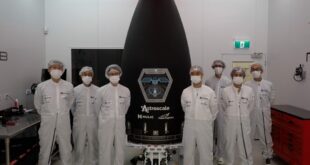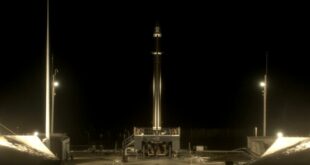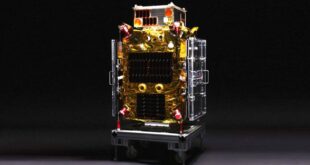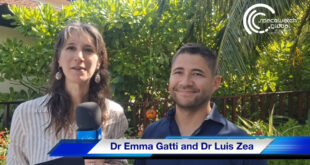
The Harwell Space Cluster, Europe’s most concentrated group of space organisations located at Harwell Science and Innovation Campus, has released its 10-year growth strategy. Already recognised internationally as the UK Space Gateway, the strategy supports the cluster’s ambition to become the most compelling global gateway to the space sector, making it an even more powerful engine of growth, innovation, and investment for the whole of the UK. The strategy supports the cluster’s ambition to reach 200 organisations collectively employing 5,000 people by 2030.
The strategy builds on the cluster’s success over the last 10 years, which has seen it grow from a couple to 105 organisations, and cemented its role as a platform for UK space companies and for international companies looking to get a foothold in the UK space market – achieved through a strategic approach that fostered collaboration and created a nurturing and innovative environment for companies to grow.
Looking at the next ten years, the focus is on scaling-up these efforts – the four core areas of focus will be: increased investment in the gateway capabilities of the cluster, broadening application of expertise and open access facilities to address complex challenges, strengthening the existing skills, facilities, and business support pipeline, and increasing engagement globally to create even more opportunities for international collaboration and market access.
Space is an important engine for economic growth and a sector that continues to innovate and evolve even during times of economic uncertainty. Putting in place infrastructure and enhancing the environment that will support companies through these times is a key consideration for the cluster. Continuing to deliver projects during Covid-19, such as the construction of the UK Government funded National Satellite Test Facility by STFC RAL Space, will ensure that vital national infrastructure is in place to help companies as they emerge from Covid-19.
“Now is the time to act, particularly as we look at the post-COVID-19 landscape,” said Dr Joanna Hart, Development Manager for the Harwell Space Cluster. “By leveraging our brand, networks, global reach, expertise, and facilities in service of national priorities, the cluster will secure sustainable growth for the UK space sector.”
“ESA is proud to support the Harwell Space Cluster’s ten-year strategy,” added Magali Vaissiere, European Space Agency, Head of ECSAT Centre and Director of Telecommunications and Integrated Applications. “As the world puts in place plans to make an economic recovery from the coronavirus pandemic, space has never been more important. Space has a proven track record of promoting innovation and competitiveness to create new services and products that generate new jobs and boost prosperity.”
At RAL Space we’ve watched the Harwell Space Cluster grow around us. We stand ready to support as it sets out to deliver this ambitious strategy. Our expanding facilities, expert workforce and ability to tackle complex challenges help make Harwell the perfect place for our global partners to work with the UK space sector, and for UK organisations to springboard out into the world,” said Professor Chris Mutlow, Director of STFC RAL Space.
“This strategy builds on Harwell’s global reputation, world-class facilities and diverse innovation environment to ensure the UK’s vibrant space sector acts as an engine of growth for the whole country,” continued Colin Baldwin, Head of Local Growth Strategy, UK Space Agency. “We are working closely with partners on the Campus and across the UK as we develop a comprehensive national space strategy that will make the UK the best place to start, locate or grow a space business.”
Multi- and inter-disciplinary collaboration will continue to be nurtured as part of the strategy to support shared learning and problem solving. Recently, Astroscale, a company focused on developing technology and services to remove space debris and extending the orbital life of space technology, has entered a collaboration with Northumbria University to explore decommissioning practices in the oil and nuclear sectors to bring insights to the satellite industry and encourage responsible behaviour in space, and improving space environmental protection.
Enhancing the ecosystem to support start-ups is a vital component of the cluster strategy. The STFC managed European Space Agency Business Incubation Centre United Kingdom (ESA BIC UK) provides funding, business advice, access to space expertise and laboratories to start-ups wanting to break into the space sector. One company benefitting from funding and support is Lanterne which has developed an application that facilitates social distancing using space enabled data. Despite the current challenging markets, two ESA BIC UK alumni incubated at Harwell, Flox (formerly Thrive MV) and Orbital Witness have recently raised equity capital. In total 85 companies have been incubated by the ESA BIC UK and they have collectively raised over £73m.
Providing room for companies to grow is part of the overall Campus strategy which in turn supports the growth of the all the Harwell clusters. In the last six months, new space companies seeking the competitive advantage that Harwell provides include hiSky, Borwell, Raytheon and B2B Space. Inmarsat, the world leader in global mobile satellite communications, established a presence at Harwell at the end of 2019.
Operating at the forefront of space science, innovation, and enterprise the Harwell Space Cluster currently comprises 105 organisations (which collectively employ 1,100 people) including the UK and European Space Agencies, STFC RAL Space and the Satellite Applications Catapult as well as start-ups and SMEs through to medium and multinational firms.
The Space Cluster Strategy can be found here.
This announcement was made on 22 May 2020.





